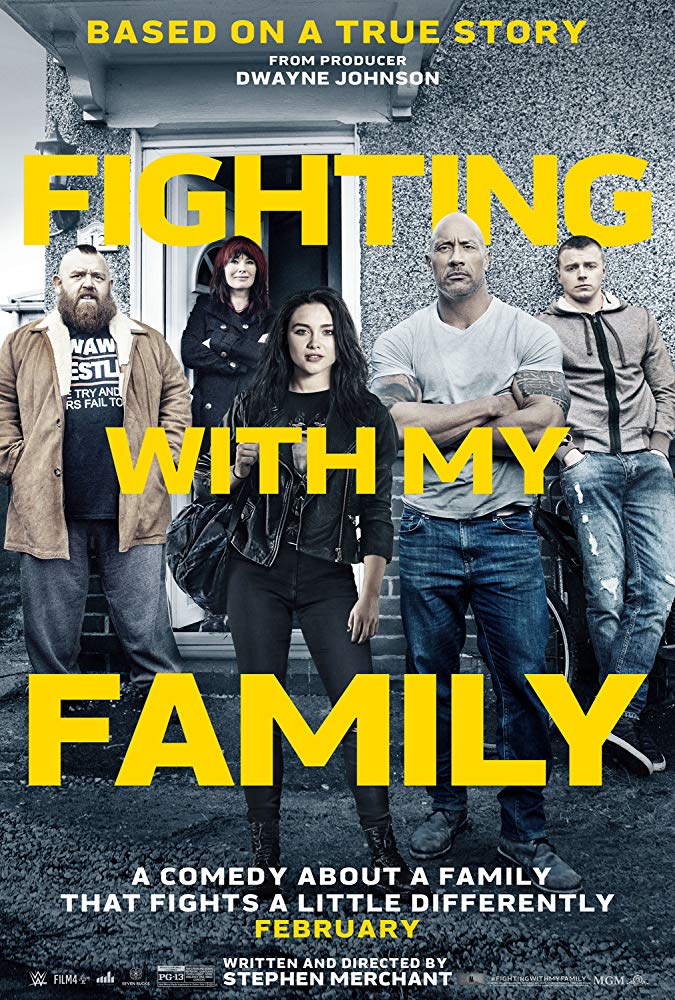Nine years since he made his cinematic directorial debut with Cemetery Junction, Stephen Merchant has returned to the big-screen to direct and write Fighting with My Family, a comedic biopic centred around the rise of WWE pro-wrestler Paige (real name Saraya Knight) as she deals with fame and the pressures of her wrestling family. The resulting film is pretty much as expected, a typical true story following the rise and potential fall of a celebrity, whilst also tackling the personal demons of the lead and the characters surrounding them.
Personally, I always find reviewing biopics very difficult as it often results in me retorting the same old mantras; the lead performance is very strong, the supporting cast deliver solid but unmemorable turns, the story completely ignores or doesn’t delve deep enough into the more intriguing true events and the cinematography is particularly uninspiring. Fighting with My Family is all those things. It’s fine and (mostly) inoffensive but it’s very much the kind of film that I will only remember when I spot it on Netflix in a year or two.
This wouldn’t bother me so much if it weren’t for the persisting phenomenon that is placing biopics on an artistic pedestal. Looking at this year’s Academy Award Best Picture nominees, half of the films nominated were confidently biopics with another two being directly inspired by actual people, leading to only a quarter of the nominees being primarily fictitious.
Several of these nominees did in fact make creative and artful decisions that allowed them to transcend their genre, but it’s impossible to ignore the commercial and awards successes of both Bohemian Rhapsody and Green Book in particular. Despite being focused around a figure infamous for his partying and drug abuse, the surviving members of Queen ensured a large degree of creative licence over the Freddie Mercury picture, maintaining their image and keeping it at a family-friendly 12A certificate to ensure upmost commercial profitability. Furthermore, Green Book has come under similar scrutiny after Don Shirley’s family critiqued the events depicted in the film as being largely false. Despite these controversies, Bohemian Rhapsody went on to win four Academy Awards (the most awarded at this year’s ceremony) and the Academy selected Green Book as 2018’s Best Picture.
Shifting focus back over to Fighting with My Family, here we have another biopic that is 12A-rated and is further produced by a movie star and ex-wrestler (Dwayne ‘The Rock’ Johnson) and the WWE itself. Therefore, why am I not surprised when this film takes no risks in portraying riskier elements of Paige’s career and pulls every punch in even slightly critiquing the WWE or its shady CEO, Vince McMahon.[embedyt] https://www.youtube.com/watch?v=WqF3VTv0cqU[/embedyt]
When Fighting with My Family fades to black and indulges in the classic biopic cliché of showing on-screen text as an epilogue, it states that Paige was one of the chief personalities in the ‘women’s revolution’ that advocated for female wrestlers to share the same respect and airtime as their male counterparts. This is already quite a simplistic interpretation of the issue, considering this is still very much a problem in the WWE and there are many other integral figures beyond Paige. However, it is made even more baffling by the fact that at no point in the film itself is this a major plotline or even really mentioned. What should be a film centred around female empowerment is reduced to a commercially amicable picture with a renowned family-friendly male producer shoved into the narrative to preach the importance of uniqueness to the audience.
WWE are a ‘PG network’ that do not want to deal with hard controversy or issues. There are already reported stories of WWE producers threatening to cut Dwayne Johnson’s microphone during filming because he was inciting the crowd to chant CM Punk’s name, a former wrestler who the WWE are in an active lawsuit with. On the contrary, this film also features a tone-deaf scene where Dwayne Johnson (playing himself) calls Vince Vaughn’s character ‘sex-tape’ because “he makes you famous”, even though the real-life Paige notoriously dealt with sexual footage of herself being leaked online. On that basis, maybe it was wise that the creative ‘boys-club’ behind this film stayed away from anything too complex.
In giving Fighting with My Family some credit, Merchant does provide a witty script that caters to his cringe-comedy sensibilities seen in The Office and Extras, whilst also providing an interesting dichotomy between the success of Florence Pugh’s Paige and the failures of her brother Zak, played by Jack Lowden. Still, this once again caters to the argument of how safe this film is, for Merchant shows no real flair in directing the wrestling sequences, especially in comparison to his comfortableness in directing any comedic scenes based in Norwich.
Like many of its biopic brethren, Fighting with My Family is made by the wrong people for the wrong reasons but simply disguised as being made for the right reasons. It’s a safe cookie-cutter production built to sustain a brand that could easily be elevated if it were made by more suitable people with greater artistic flair and a taste for storytelling beyond its commercial viability. General audiences will probably be pleased, and I don’t judge them for that, but I can’t help but uselessly shake my fist and demand better filmmaking in a genre seemingly dominated by historic revisionism.
Image Source: IMDB

